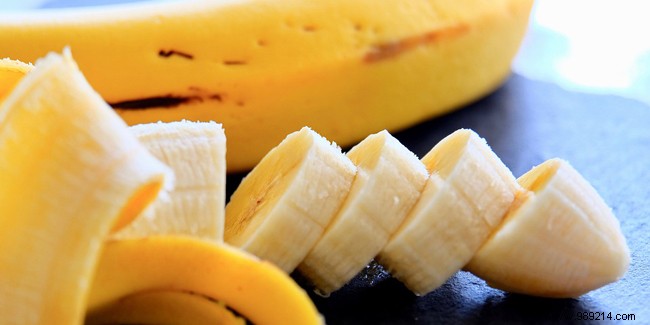
The banana is a fruit that almost everyone loves for its good taste, its sweetness and its satiating power. It is also easily transportable and thus makes the happiness of young and old alike to fill a little hollow or to decorate a snack. On the other hand, it has the reputation of making you fat. So what about its nutritional values , and is it good for your health ? Here are some pointers on the subject.
The word banana comes from the Arabic "banan" meaning finger and it has been cultivated by man for about 12,000 years. There are two kinds of bananas:the one that is eaten as a dessert, sweet and raw or flambéed and the plantain banana which is cooked and salted. We are going to talk about the banana that we know as a sweet fruit . Its nutritional density is important since 100 g of banana contains 90.5 Kcal against 122 Kcal for the plantain banana. The fruit banana has a moderate glycemic load for a strong antioxidant power. This fruit is also:
Good to know :despite its number of calories, the banana should not be excluded from slimming diets, because it is very satiating and avoid snacking. It is still rich in fiber, starch and minerals which are elements that promote and regulate intestinal transit.
For 100 gr of banana, we have seen that the number of calories is 90.5 gr. Here are the nutritional values of this fruit for the same weight:
Bananas still contain many nutrients, listed below.
This fruit, the banana, is quite complete and contains a wide variety of nutrients necessary for the proper function of our body. Thus, we find:
The banana is a fruit that can be eaten on a daily basis, because its taste is very appreciable, but it is also a real ally for maintaining good health. This fruit therefore has a place of choice in our diet so that it is varied and balanced.
Bananas are rich in antioxidants. A study was conducted on several thousand women showing that high fruit consumption helped prevent risks of kidney cancer . Among all these fruits, the researchers found that the banana ranked first. It would also have the same effect on the risk of colorectal cancer.
Studies have been conducted on the involvement of bananas in chronic diarrhea in children. Unripe banana has been found to help slow diarrhea in babies . Unripe bananas contain resistant starch which is found intact in the colon. This undigested starch is not fermented and is converted into short chain fatty acids. Thus, liquids and salt are stimulated and help to reduce water loss. These same fatty acids would also help permeabilize the small intestine and thus help relieve chronic diarrhea. Mixed with rice, plantain would also significantly reduce chronic diarrhea.
Studies have been conducted in animals such as rats showing that banana extract protects the stomach wall against ulcers. It should be noted that this finding comes from the banana variety called Hom. If a person has a stomach ulcer problem, it should be noted that current research on bananas in the prevention or treatment of stomach ulcers is still insufficient and that only medical advice is needed. in this case.
When obese people suffer from diabetes TII, the unripe banana could be consumed because it contains resistant starch helping to improve the contact of cells with insulin. Thus, blood sugar would be reduced as well as insulin secretion. During meals, by regularly consuming unripe bananas, ghrelin would increase. This hormone also improves insulin sensitivity.
During a meal, if a person consumes three bananas, the free radicals in the body are reduced two hours after the ingestion of the bananas. The bad cholesterol is also reduced and thus helps to prevent the risk of cardiovascular problems. More future studies should be carried out so that the effects of the banana are as effective with lower doses of the fruit.
The banana is a fruit also containing antioxidants involved in the prevention of cardiovascular diseases, certain cancers and some chronic diseases. The Cavendish Banana which is the most widespread in the world contains dopamine and vitamin C giving it a high antioxidant capacity.
Banana is a fruit to be eaten in certain actions or in certain states. Thus, it is particularly recommended:
As we have seen, the banana remains caloric and must be consumed in moderation when you are overweight. Although it can be integrated into a diet, it is necessary to alternate it with other less sweet fruits .